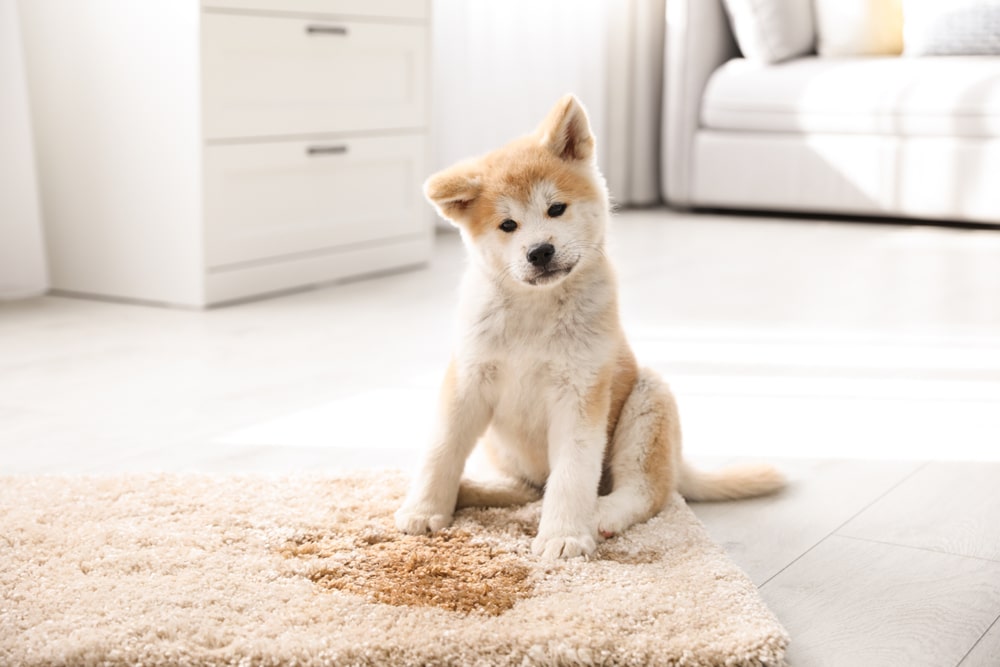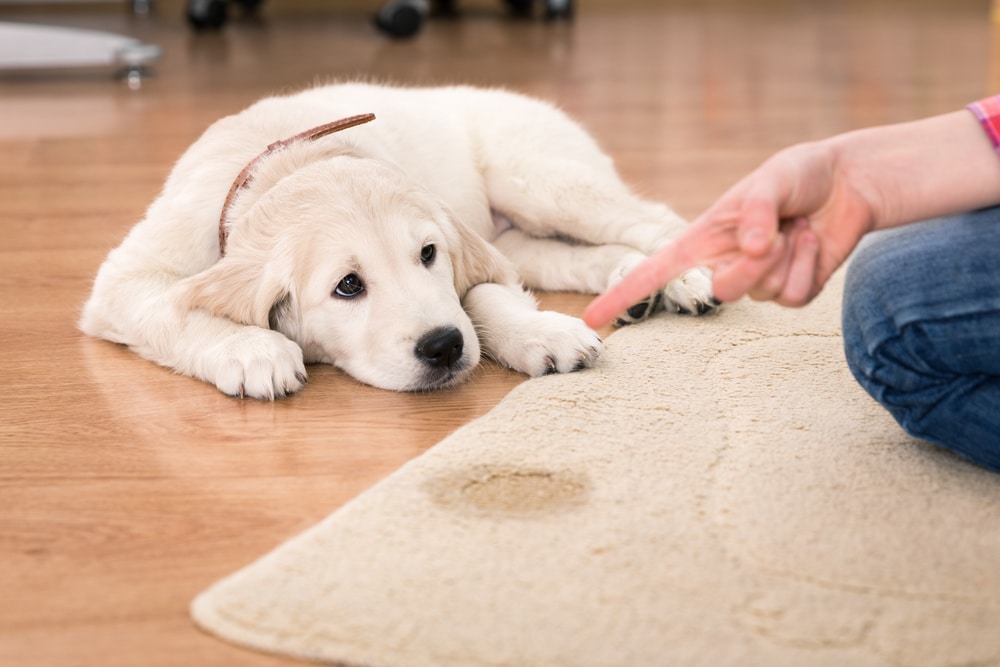It can be extremely frustrating if your dog has urinary accidents in the house. There are many different training techniques for these situations, but should you ever rub your dog’s nose in their pee?
It is never appropriate to rub your dog’s nose in their pee. This is a punishment-based technique. Not only can it cause fear and anxiety in your pup, but it is also often performed too long after they urinate in the house to be effective. There are kinder and more effective ways to house-train your puppy, including using positive reinforcement and crate training. If your dog has previously been fully house-trained and begins having accidents, there may also be medical issues at play that require evaluation from your vet.
Table of Contents
Types of Dog Training Techniques
There are many different techniques used to train dogs, which can be broken down into several categories. In general, after an animal performs a behavior, it will either feel good or bad.
If they feel good after a behavior they are likely to repeat it in the future, and if they feel bad they will avoid it. This is how reinforcement and punishment lead to a desired outcome. A reward or consequence must occur immediately after the behavior to be effective.
Reinforcement Based Techniques
Reinforcement is used to encourage a wanted behavior.
Positive Reinforcement
Positive reinforcement uses something of high value to your dog, such as a favorite treat, as a reward immediately after a wanted behavior. Giving your puppy a treat after they go potty outdoors or sit on command is a good example. Not only is using positive reinforcement an extremely effective method of dog training, but it also helps create a strong bond with your dog.
Negative Reinforcement
Negative reinforcement involves removing a negative stimulus after a wanted behavior. For example, putting downward pressure on a dog’s hips to get them to sit, and removing the pressure once they are sitting.
Punishment-Based Techniques
Punishment is a consequence following an unwanted behavior to try to prevent it in the future.
Positive Punishment
Positive punishment involves using a negative stimulus after an unwanted behavior. For example giving your dog a correction with a prong collar for pulling on the leash, or using a shock collar to prevent barking. Rubbing a dog’s nose in its pee is an example of positive punishment. These techniques can lead to increased behavioral issues such as fear, anxiety, and aggression in some dogs.
Negative Punishment
Negative punishment involves removing a desired stimulus, such as removing your hand and stopping play if your puppy is nipping your fingers.
How to House-Train A Puppy

You should never rub your dog’s nose in their pee or use other forms of punishment when house-training a dog or puppy, so what should you do instead?
Choose A Potty Spot And Use Positive Reinforcement
Pick a spot where you would like your dog to urinate and defecate, and give them lots of opportunities to do so. You can also choose a word such as “go potty” or “hurry up” that your pet will begin associating with going potty. Be sure to use lots of treats and praise immediately after they go!
Crate Training
Crate training is not a required part of house-training, however it can be very beneficial in many cases. It also provides your dog with a safe space where it can be left without supervision.
If the crate is the correct size, your puppy will not want to urinate or defecate in it. It will hold it until you take them to a desired potty area. If your puppy doesn’t potty you can put them back in the crate and try again in a few minutes.
It may take your dog some time to get used to the crate, but it is important to go slowly and make sure it is a positive experience, for example by feeding meals and treats in the crate.
When You Should Take Your Dog To Go Potty
It is best to give your dog many opportunities to go potty in the desired location. Make sure to take your pup out every two hours (even if they are crated). This gives your dog multiple opportunities to go potty and allows you both to practice positive reinforcement when they do so successfully.
While all puppies are different, most will have to urinate and defecate at certain times of day and after certain activities. You can take advantage of this when timing your potty breaks.
Always give your pup a chance to go potty after waking up, letting them out of the crate, eating a meal, or during a big play session. It is best to feed your puppy at consistent times of the day and remove food and water before bed. You will get to know your puppy and be able to identify when they need to go potty as well.
What To Do If An Accident Happens
Accidents are a normal part of house-training and something that all pet parents are familiar with. Never punish your dog for having an accident.
If you catch them in the act, you can say a firm “no” to startle them, then pick them up (if possible) and take them to their potty area. If they finish going potty in the correct area praise and reward them. And if you find an accident after the fact, just clean it up with an enzymatic cleaner and move on. It will be too late for your dog to learn from this incident at that point.
What To Do If Your House-Trained Dog Begins Having Accidents?
It can be stressful if a dog that is previously house-trained begins having accidents. It can also indicate an underlying medical or behavioral issue that needs to be addressed.
Rule Out Underlying Medical Issues
Urinary accidents in the house can occur as a symptom of several different disease processes of the urinary tract, including urinary tract infection, cystitis (inflammation of the bladder), bladder stones, and cancer. Accidents may also occur if your dog is in pain (for example due to arthritis), or otherwise unable to make it outside or hold the position needed to urinate. A trip to your vet is a good first step in ruling out underlying diseases. In some cases your dog may be experiencing other symptoms as well, but not always.
Restart House-Training
Once medical concerns are ruled out, it is a good idea to look at your dog’s mental health. Accidents can occur in times of stress or anxiety. Or it may be that your dog needs a refresher course in house-training. Go back to crating them when unsupervised, providing frequent potty breaks, and reinforcing with rewards.
Conclusion: Should You Rub Your Dog’s Nose In Their Pee?
Punishment is not a kind or effective way of house-training your dog. Instead, focus on repetition and rewarding good behavior. If you feel you may need professional help, reach out to your vet.
